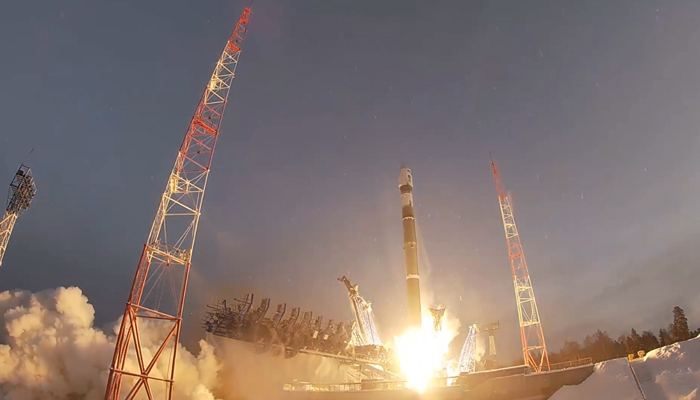[ad_1]
“A stable telemetry link has been established and maintained with the spacecraft,” the ministry states

Russian defence ministry said Wednesday that it has successfully deployed a new military satellite into earth’s orbit with the help of Soyuz-2.1b rocket that lifted-off from the city of Arkhangelsk.
The launch comes months after Russia suffered a setback after it lifted off its moon mission in August which crashed on the lunar soil.
“On December 27 at 10:03 am combat crews of the RAF space forces conducted a launch of a light-class Soyuz-2.1b rocket with a space device in the interest of the Russian Defense Ministry, from the state testing cosmodrome of the Russian Defense Ministry in Arkhangelsk region (Plesetsk),” the ministry said.
According to the officials, the lift-off and the rocket’s voyage to its targeted place had gone off without a hitch and the whole process was monitored by an automated ground-control complex.
“A stable telemetry link has been established and maintained with the spacecraft,” the ministry stated adding that the onboard systems were operating normally.
A similar launch was conducted by the Soyuz-2.1b rocket which carried military devices into the earth’s orbit in October.
The defence officials did not provide any information about the purposes and the total number of devices deployed outside Earth.
The Russian space agency Roscosmos mentioned that total 67 launches were conducted using Soyuz-2.1b rockets between December 27, 2006 and November 25, 2023. As many as some 577 devices have been delivered into the space.
In late August, Russia blasted off its lunar lander Luna-25 mission to the moon which failed achieve stated objectives. It crashed on the moon after an unsuccessful orbital manoeuvre on August 19.
It was Russia’s first lunar mission since 1976, marking a significant setback to the Russian space programme overseas, however, Moscow vowed to pursue the space ambitions despite failures.
The mission’s failure sparked concerns about the condition of Russia’s space programme, which has been beset by problems ever since the Soviet Union fell apart in 1991.
The Kremlin’s response, however, reveals a determination to move further in the international space competition despite this setback.
In a call with reporters, Kremlin spokesman Dmitry Peskov said: “This is not a reason to despair, nor to tear our hair out. This is another reason to analyse the causes (of the failure) and eliminate them next time.”
[ad_2]

